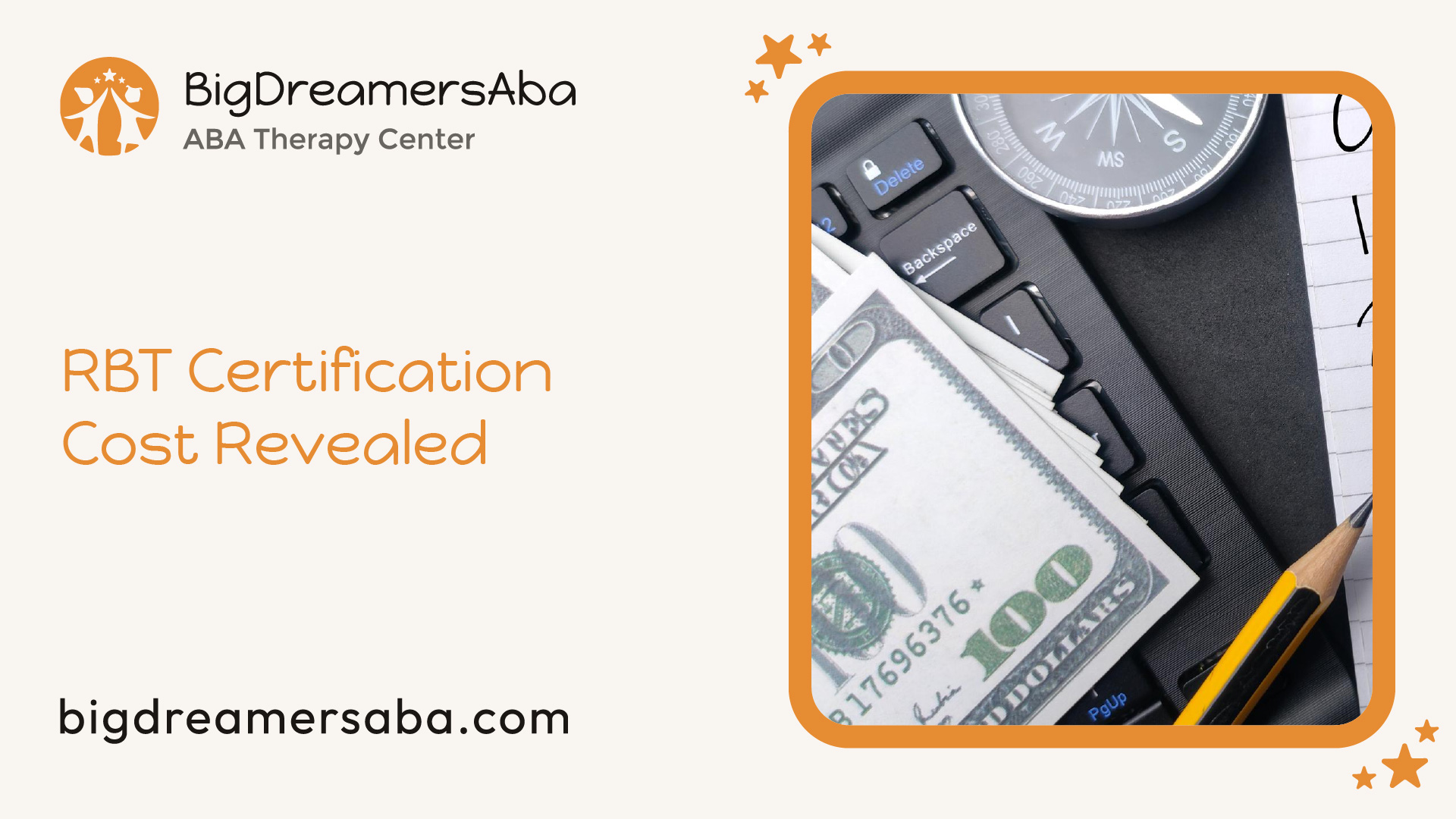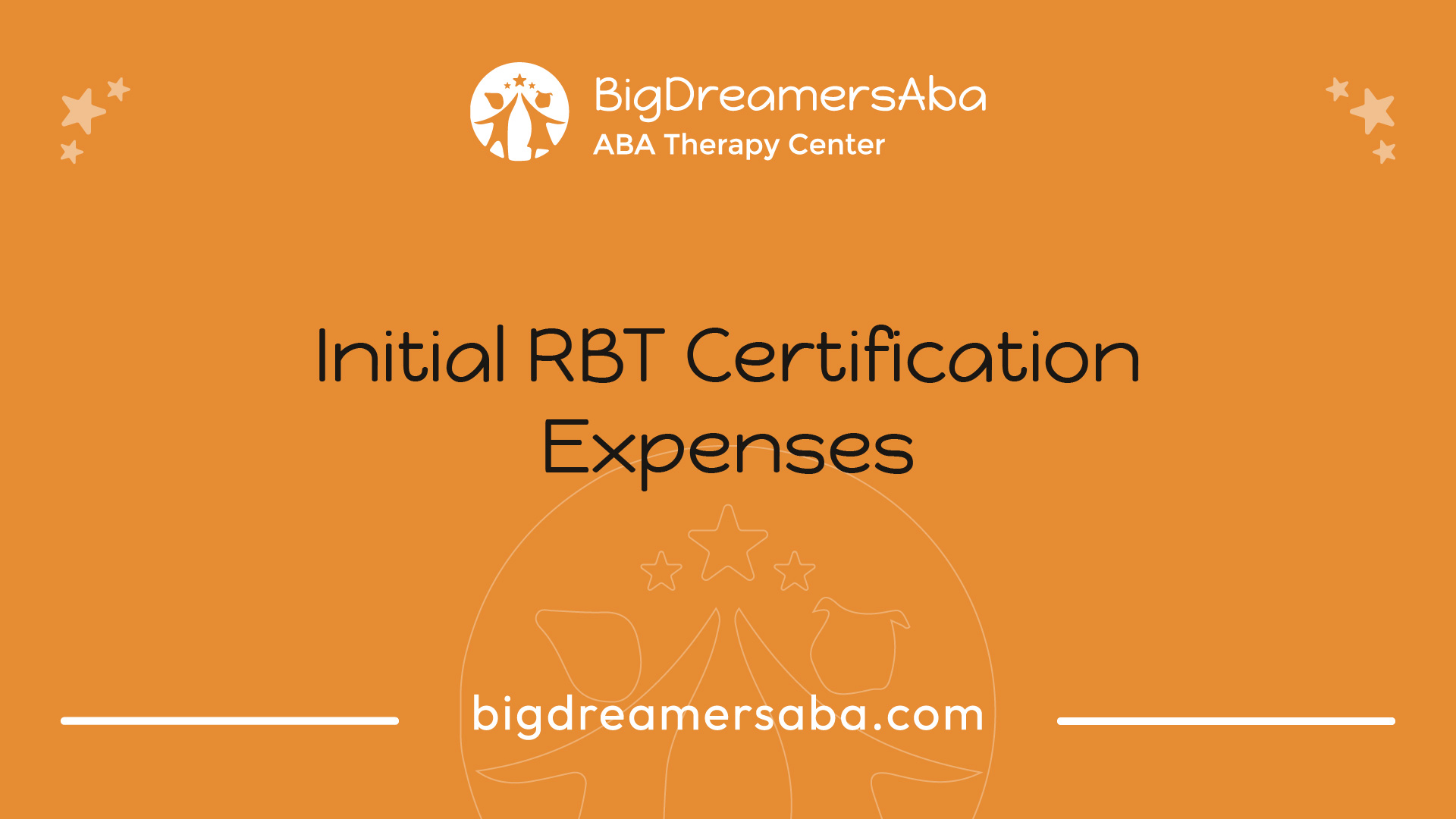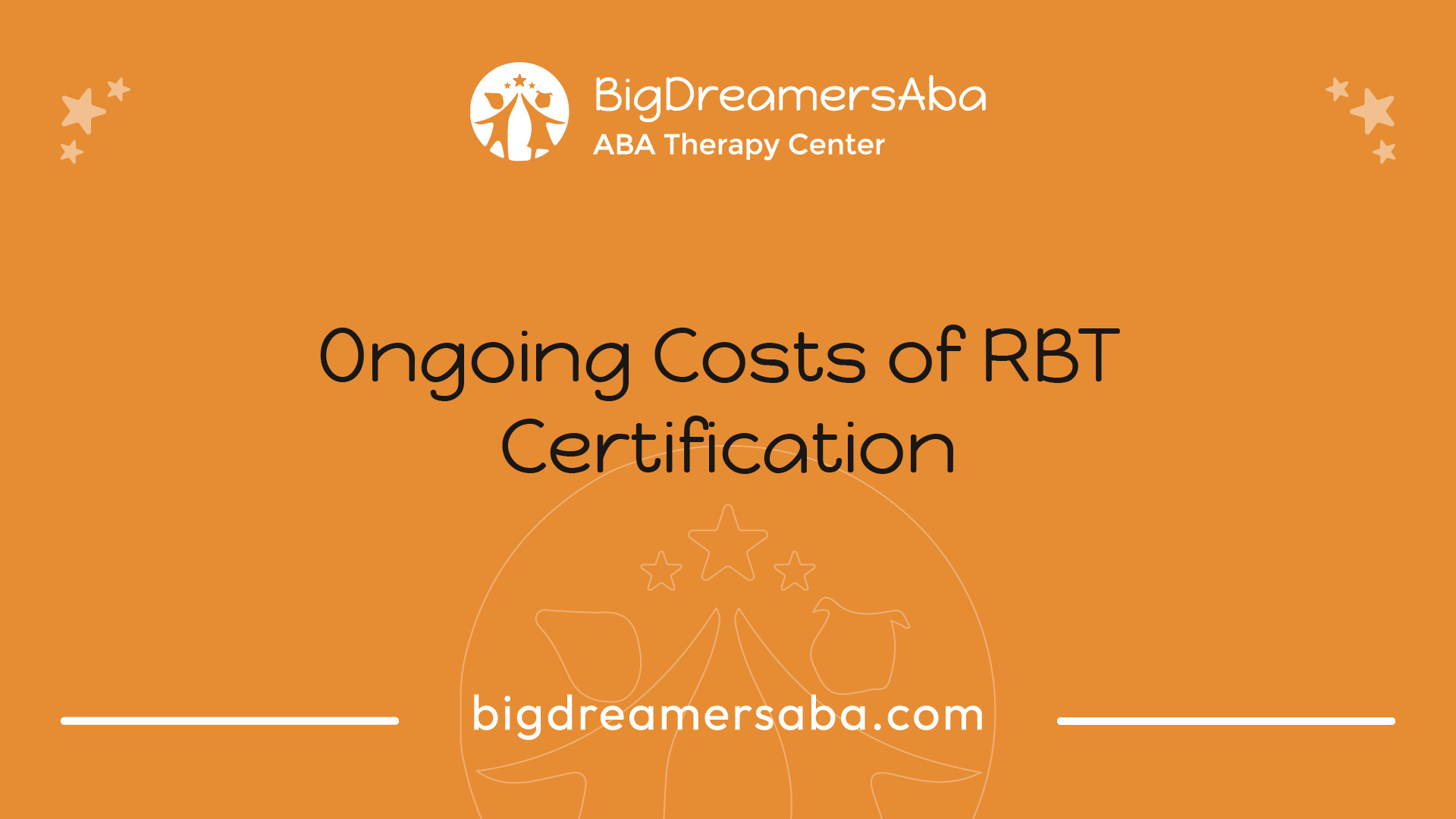RBT Certification Cost Revealed
Discover the true RBT certification cost and unlock a future filled with career growth and higher earnings.

Understanding RBT Certification Costs
Before embarking on the journey to become a Registered Behavior Technician (RBT), it's important to understand the costs associated with the certification process. Several factors influence these costs, and budgeting accordingly can help individuals prepare financially for the certification journey.

Factors Influencing Costs
The cost of RBT certification can vary depending on a few key factors, including:
- Training Program Costs: Completion of a training program is a requirement for RBT certification. The cost of these programs can vary based on factors such as the provider, location, and format (in-person or online). Training programs typically range from 40 to 60 hours in length, and the associated costs should be considered when budgeting for certification.
- Examination Fees: To become a certified RBT, individuals must pass the RBT certification exam. The examination fee is $45, as outlined by the Behavior Analyst Certification Board (BACB) [1]. This fee covers the cost of the exam itself and the processing of the certification application. It's important to factor in this expense when budgeting for certification.
- Additional Expenses: In addition to the training program and examination fees, there may be additional expenses to consider. These can include study materials, practice exams, and any other resources that individuals may find beneficial during their preparation for the certification exam. It's important to research these additional costs and incorporate them into the budgeting process.
Budgeting for Certification
Budgeting and financial planning are essential steps in preparing for the expenses associated with RBT certification. By understanding the factors influencing costs and considering the following steps, individuals can better manage the financial aspects of their certification journey:
- Research and Compare Training Programs: Take the time to research different training programs and compare their costs. Consider factors such as the program's reputation, content, and delivery format. This will help in finding a program that fits both your budget and learning needs.
- Set Aside Funds for Examination Fees: Plan to allocate funds specifically for the RBT certification exam fee. By setting aside this amount in advance, individuals can ensure they have the necessary funds when it comes time to apply for and schedule the exam.
- Explore Financial Assistance Options: Financial assistance options, such as scholarships, grants, or employer sponsorship, can help offset some of the certification costs. Research and explore these opportunities to determine if you are eligible to receive financial support. Employer reimbursement or coverage for certification expenses is also worth investigating, particularly in fields like education and healthcare.
- Create a Comprehensive Budget: Develop a budget that takes into account not only the initial certification expenses but also ongoing costs such as renewal fees and continuing education requirements. This will provide a clear overview of the financial commitment associated with maintaining RBT certification over time.
By understanding the factors influencing RBT certification costs and budgeting accordingly, individuals can proactively plan and manage the financial aspects of their certification journey. Remember to explore financial assistance options and create a comprehensive budget to ensure a smooth and financially manageable path toward becoming a Registered Behavior Technician.
For information on the benefits of RBT certification, such as career advancement and higher earning potential, continue reading the next section on Benefits of RBT Certification.
Initial RBT Certification Expenses
Before embarking on the journey to become a Registered Behavior Technician (RBT), it's important to understand the initial expenses associated with obtaining the RBT certification. These expenses include training program costs and examination fees.

Training Program Costs
To become an RBT, individuals are required to complete a 40-hour training program that covers the necessary knowledge and skills outlined by the Behavior Analyst Certification Board (BACB). The cost of these training programs can vary depending on the provider and the format of the training (in-person or online).
While the cost of training programs can range, it typically falls between $100 to $400, according to Songbird Therapy. It's important to research and compare different training programs to find one that fits your budget and meets the requirements set by the BACB.
Examination Fees
After completing the required training program, individuals must pass the RBT examination to obtain certification. The examination fee is an additional expense associated with becoming an RBT.
The application fee for the RBT examination through the Behavior Analyst Certification Board (BACB) is typically $50. Additionally, there is an examination fee of approximately $45. These fees are subject to change, so it's important to check the most up-to-date information on the BACB's website.
Preparing for the examination may also require additional expenses, such as study materials and practice exams. These resources can help individuals feel more confident and prepared for the examination.
By understanding the initial expenses of training program costs and examination fees, individuals can plan and budget for the financial aspect of pursuing RBT certification. It's worth noting that certain employers may provide financial assistance or reimbursement programs to support their employees in obtaining RBT certification. To explore financial assistance options, including employer sponsorship and scholarships/grants, refer to the next section of this article.
Ongoing Costs of RBT Certification
Once an individual has obtained their Registered Behavior Technician (RBT) certification, there are ongoing costs associated with maintaining the certification. These include renewal fees and the completion of Continuing Education Units (CEUs) to ensure professional development.

Renewal Fees
To keep the RBT certification active, individuals are required to pay a renewal fee. The exact amount may vary depending on the certifying organization, but it typically ranges from approximately $45 to $85 per year [2]. Renewal fees contribute to the administrative expenses associated with managing the certification program and ensuring the continued validity and professionalism of RBTs.
Continuing Education Units (CEUs)
In addition to renewal fees, RBTs must also fulfill CEU requirements. CEUs are a measure of professional development and are intended to ensure that RBTs stay up to date with the latest practices, research, and techniques in the field of applied behavior analysis.
To maintain certification, RBTs must complete a certain number of CEUs within a specified timeframe. Typically, RBTs are required to complete 20 CEUs every two years [1]. The cost of CEUs can vary depending on the provider, ranging from $10 to $50 per credit hour [2]. CEU courses cover a wide range of topics relevant to the field of applied behavior analysis, allowing RBTs to expand their knowledge and enhance their skills.
Ensuring that the renewal fees are paid promptly and completing the required CEUs are essential for maintaining RBT certification and staying active in the field. By meeting these ongoing requirements, RBTs demonstrate their commitment to professional growth and development, ensuring that they continue to provide high-quality services to their clients.
For more information about the RBT certification process and career opportunities in the field, check out our article on the best RBT career path.
Financial Assistance Options
For individuals considering pursuing their RBT certification, there are financial assistance options available to help cover the associated costs. These options include scholarships and grants, as well as employer sponsorship programs.
Scholarships and Grants
Scholarships and grants are aimed at aspiring behavioral analysts who may face financial barriers in obtaining their RBT certification. These funding opportunities provide financial assistance to help cover the costs associated with the certification process.
Individuals can research and apply for scholarships and grants specifically designed for those pursuing RBT certification. These funding sources may cover expenses such as training program costs, examination fees, and even ongoing renewal fees. By securing a scholarship or grant, individuals can significantly reduce the financial burden of obtaining their RBT certification.
To explore available scholarships and grants, individuals can reach out to local organizations, educational institutions, and behavior analysis associations. These resources can provide information on eligibility criteria, application processes, and deadlines. It's important to thoroughly review the requirements and submit all necessary documentation to increase the chances of securing financial assistance.
Employer Sponsorship
Employers in the field of Applied Behavior Analysis (ABA) may offer financial assistance through sponsorship programs to support their employees in obtaining their RBT certification. These programs can cover various expenses associated with certification, including training program costs, application fees, and examination fees.
By partnering with an employer who offers sponsorship for RBT certification, individuals can benefit from financial support and potentially have a portion or all of their certification costs covered. It's important to inquire with employers about the specific details of their sponsorship programs, including any requirements or agreements that need to be met.
Employer sponsorship not only helps individuals financially but also demonstrates an employer's commitment to investing in their employees' professional growth and development. This can create opportunities for career advancement and potentially increase earning potential. To explore employer sponsorship options, individuals can engage in conversations with their current employer or seek employment with companies known to offer financial assistance for RBT certification.
By taking advantage of scholarships, grants, and employer sponsorship programs, individuals can alleviate the financial burden of obtaining their RBT certification. These financial assistance options make the certification more accessible and affordable, allowing individuals to invest in their future and pursue a rewarding career in Applied Behavior Analysis.
To learn more about the benefits of RBT certification, including career advancement and higher earning potential, continue reading our article on best RBT career paths.
Benefits of RBT Certification
Obtaining RBT certification comes with several benefits that can positively impact one's career in the field of Applied Behavior Analysis (ABA). Let's explore two significant advantages: career advancement and higher earning potential.
Career Advancement
RBT certification opens doors to various career advancement opportunities within the field of ABA. Certified RBTs are recognized for their specialized knowledge and skills, making them valuable assets to employers. With certification, individuals may qualify for more advanced roles and responsibilities, such as working with higher-level clients or taking on supervisory positions.
As an RBT, gaining experience and expertise through certification can lead to increased professional growth and recognition. It allows individuals to expand their scope of practice, collaborate with other professionals in multidisciplinary teams, and contribute to the development and implementation of behavior intervention plans.
Higher Earning Potential
One of the key advantages of RBT certification is the potential for higher earning. Certified RBTs often qualify for higher pay rates compared to those without certification. Employers recognize the value and expertise that comes with RBT certification, making it a worthwhile investment in one's career [1].
The average hourly wage for RBTs typically ranges from $15 to $25, although this can vary based on factors such as location, experience, and employing organization. With certification, individuals may have access to a wider range of employment opportunities within ABA, including schools, clinics, hospitals, and residential facilities. It's important to consider the potential for job satisfaction and personal fulfillment when evaluating the return on investment of RBT certification [2].
By investing in RBT certification, individuals can enhance their career prospects, expand their expertise, and potentially increase their earning potential within the field of ABA. It is a valuable step towards professional growth and recognition in the industry. To explore the best career path for RBTs and learn more about average salaries, visit our article on best RBT career paths.
Cost-Effective Training Strategies
When considering RBT certification, it's essential to explore cost-effective training strategies that can help individuals pursue their certification without breaking the bank. Two options worth exploring are free or reduced-cost training and employer coverage options.
Free or Reduced-Cost Training
For individuals seeking affordable training options, free or reduced-cost training programs can provide significant cost savings. These programs make learning opportunities accessible and flexible, regardless of financial circumstances. One example is the Autism Partnership Foundation, which offers a FREE 40-hour RBT training based on the 2nd edition task list, meeting the requirements outlined by the BACB for RBT certification. Certificates are provided upon completion [3]. These programs not only help individuals gain the necessary skills for RBT certification but also eliminate the financial barrier that may limit access to training resources.
Additionally, scholarships and grants are available to cover costs associated with training materials, courses, and certification exams. These financial assistance options further support individuals in pursuing their RBT certification. By taking advantage of free or reduced-cost training programs and financial assistance opportunities, individuals can lower their overall certification expenses and make their career goals more attainable.
Employer Coverage Options
In certain industries, employers often cover the cost of RBT training for their employees, especially in competitive job fields like ABA therapy. Businesses recognize the value of RBT certification as it opens up opportunities for higher salaries from the beginning of an individual's career [4]. If you are already working in a field related to ABA therapy or a business affiliated with ABA therapy, it's worth exploring whether your employer offers coverage for RBT training expenses. This can significantly reduce or even eliminate the financial burden associated with obtaining RBT certification.
By taking advantage of employer coverage options, individuals can receive the necessary training without incurring out-of-pocket expenses. This not only provides a cost-effective way to pursue RBT certification but also demonstrates an employer's investment in their employees' professional development. It's advisable to inquire about employer coverage options and any requirements or obligations associated with them to make an informed decision about your training journey.
By considering free or reduced-cost training programs and exploring employer coverage options, individuals can significantly reduce the financial burden associated with RBT certification. These cost-effective training strategies help make the certification process more accessible and affordable. Ultimately, obtaining RBT certification can lead to career advancement and higher earning potential [5].
References
[1]: https://www.songbirdcare.com/articles/rbt-certification-cost
[3]: https://www.mastermindbehavior.com/post/free-rbt-training-near-you
[4]: https://www.crossrivertherapy.com/rbt/certification-cost
Recent articles

How to Address Sleep Challenges in Children Receiving ABA Therapy

How Big Dreamers ABA Addresses Sensory Processing Challenges
